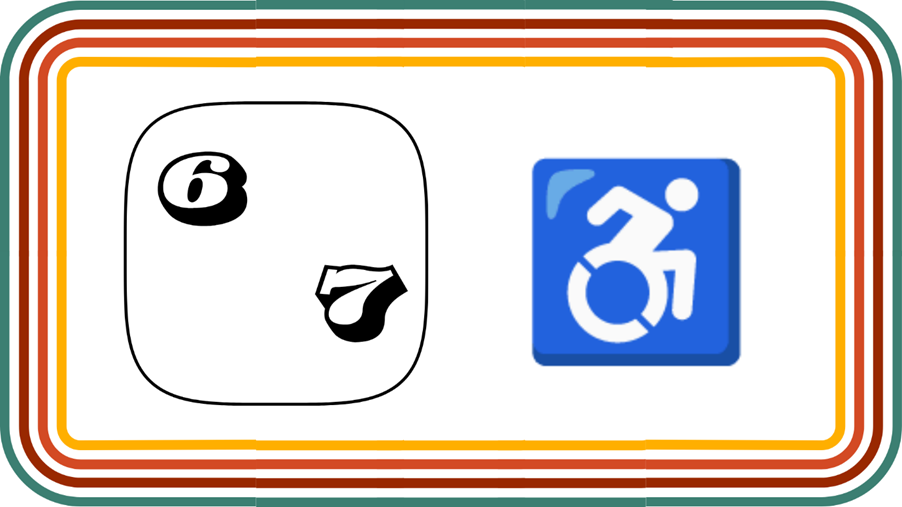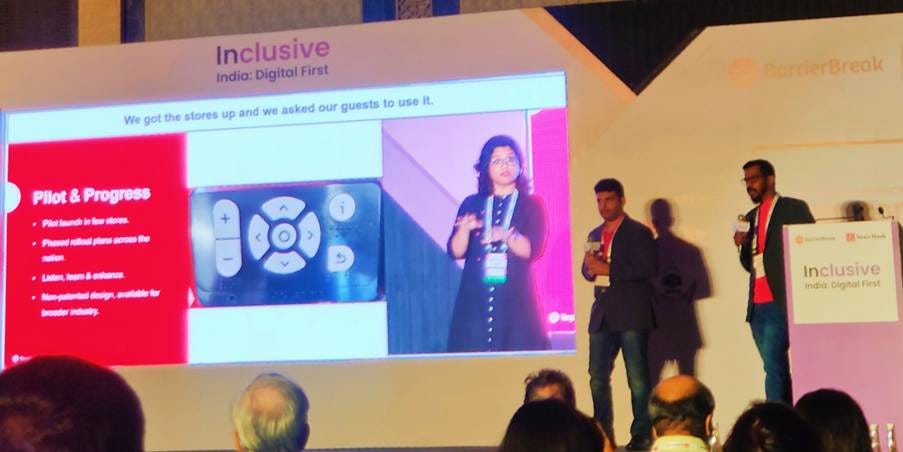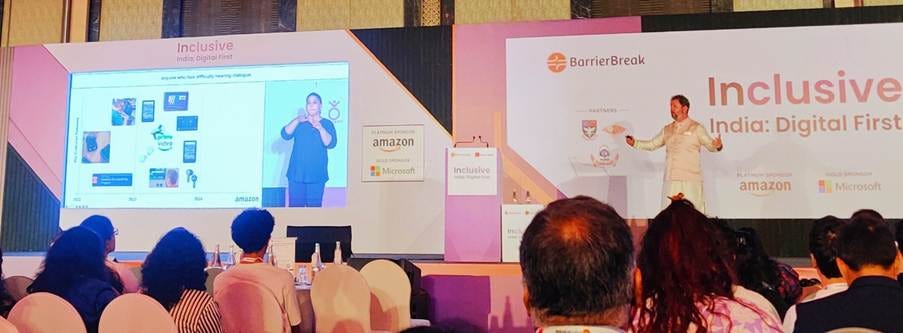A Couple Of Things – 6-7, WOTY, and Scaling Accessibility
From shifting vocabularies to accessible solutions that empower human experience, a reflection on how language shapes our world, & how inclusive actions shape our place in it.
What came first between a word and a trend is possibly an easier debate than the historic ‘chicken and the egg’ icebreaker. Maybe not, given the pace of evolution is so rapid that there’s no time to unearth the origins.
I spent a little time discovering new words and updating my vocabulary, alongside learning about interesting innovations that are making everyday, simple human experiences accessible for everyone. Read on!
Word Of The Year
Abbreviated to ‘WOTY’ by some, and ‘WotY’ by a few, ‘Word Of The Year’ has caught on as a trend across continents, amongst linguistic and academic experts, and as a measure of common voices and cultural undercurrents. I’ll stay with ‘WOTY’ for the subsequent paragraphs.
Last week, I came across this piece as a suggested read. Maybe someone somewhere knew that I didn’t know enough about ‘6-7’—hailed by Dictionary.com as its 2025 Word Of The Year. Defined as nonsensical and ubiquitous, and qualified as a brain rot. ‘Brain Rot’ was judged 2024’s Word Of The Year by Oxford—yes, the feeling has a name. Back to ‘6-7’, and an attempt to make sense of a significant rise in the usage of the word. Here’s a healthy tip to represent an illogical set of two digits in the most culturally acceptable way as captured by Dictionary.com,
‘you may also see it written as 6 7, 6-7, or six-seven, but the most important thing is to never pronounce it as “sixty-seven.”’
After understanding the hand gestures to denote ‘6-7’, I moved on to learn the origin and evolution of the WOTY list—the fascination for singling out one word from unending scrabble babble across the physical and digital world. The WOTY tradition/trend began in Germany in 1971 to recognize the German word of the year. It was started by Gesellschaft für deutsche Sprache (Association/Society for the German Language), shortened to GfdS. It became an annual affair starting 1977. It took off from Germany and became a global phenomenon, the most notable of which in the 20th century was established by the American Dialect Society (ADS).
It was an idea sparked by the late Allan Metcalf, a professor of English at MacMurray College in Illinois and executive secretary of the ADS. “I was thinking, every year TIME Magazine chooses a person of the year, and they choose it not by some computer program but rather the editors and readers making suggestions about who was influential. Why couldn’t we choose a word of the year?” Metcalf said to TIME. Many more illustrious word-factories and store-keeps caught on to the trend in the early 21st century to honour words of significance every year. I enjoyed running through the different lists, chuckling to myself, and learning a few new words along the way.
· The first ever WOTY by the ADS was ‘Bushlips’ in 1990, signifying the alleged lies by the then President of United States of America, George Bush Sr.
· It’s interesting to see ‘Twitter’ and ‘Tweet’ be the WOTYs for Australian National Dictionary Center and ADS respectively, but ‘Hashtag’ made the cut only in 2012, on the ADS list. Clearly it took time to trend.
· ‘Fake News’ and ‘Misinformation’ made it to several lists between 2016 and 2018, and the pandemic had so many words that no two lists fought for the same word in 2020.
· Dictionary.com chose ‘Identity’ as its WOTY for 2015, and ADS picked ‘They’—as in the singular pronoun—in the same year. Merriam-Webster picked ‘They’ for their 2019 list.
Unrelated tip: If you’re reading this, and don’t already, you should follow Merriam-Webster for their content on X and Instagram.
· Amongst all the lists, I found the WOTY list by Macquarie Dictionary the most entertaining. They have certainly added a trove of new words to my vocabulary. Some of the interesting ones:
- ‘Googleganger’ (2010): a person who appears in online search results when you search for your own name
- ‘Phantom Vibration Syndrome’ (2012): the perception that one’s mobile phone is vibrating or ringing when it is not
- ‘Framily’ (2017): a colloquial term for a group of people who are not related by blood but who constitute an intimate network
- ‘Covidiot’ (2020): someone who ignores public health guidelines, like social distancing or mask-wearing.
Multiplying Wins With Shared Innovations
I attended the Inclusive India Digital First conference earlier in the month, and there were presentations by Target, Amazon, Microsoft, and other organizations and individuals on topics related to accessible frameworks, solutions, policies, gaps, and opportunities. I was sitting there and was busy taming a racing mind, but couldn’t get the thought of open sourcing innovation for societal win out of my head.
Tirumangalam Rajath and Senthil Kumar Sakthivel from Target presented the mock-ups and journey of their custom-designed self-checkout kiosk launched across 2,000+ stores in America to enable an equitable experience for persons with disabilities. I was thinking of other expandable use cases with this innovation like Point-Of-Sale (POS) devices, customer navigation around the tightly stacked aisles, and audio-guided entry and exit points across different store formats. At a macro level, this experience is designed for 2,000 Target stores in America, but imagine the scale one can achieve if chains like Walmart, Costco, 7-Eleven, Home Depot, TESCO, Watsons and the like can leverage the same design and amplify the advantage to a larger customer base.
The second presentation that got me intrigued was that by Peter Korn, Director of Accessibility at Amazon. He walked through the twelve-year accessibility journey of Amazon, and how one of the organization’s core principles of customer obsession governs their accessibility work to cater to customers with disabilities. Peter and the team touched upon Dialogue Boost, a feature in Prime Video that enhances the volume of the spoken dialog as compared to the background music. I see a great opportunity for multiplying the application of Dialogue Boost to the video content with voice + music across social media platforms. Amazon’s Prime Video catalogue hosts the most audio-described English shows across the OTT platforms, something that went into my trivia books for the first time last week.
The initial success seen with AI-powered audio descriptions for videos by apps like Seeing AI and PiccyBot can be scaled for ensuring real-time accessibility of videos across TikTok, Instagram, LinkedIn, and X (formerly Twitter). With a lot of OTT platforms expanding to live events, real-time accessibility would be much desired. For the first time, it’s completely possible to unlock real-time accessibility of content with the help of AI, and Amazon Web Services (AWS) could lead the way for the entertainment industry. Imagine the collective dividend if all the production houses retain the copyrights on the content, but openly collaborate, share and leverage the innovation around delivery mechanisms to drive inclusion at scale.
During one of my X (formerly Twitter) strolls, I came across this fascinating thread by Sidin Vadukut. It brought in a different perspective to scaling innovation and multiplying reach in a country like India. When I was watching the presentations by Target and Amazon, I was gearing towards having an intentional mindset to scale inclusion by making products, services and infrastructure accessible. This is possible by infusing capital, and shaping a culture of inclusive thinking by design. Sidin’s thread outlines the opportunity to scale by incentivising and recognition—something that’d help hold the attention and action in a multi-cultural, and diverse country like India. It tackles the same objective through an incentive mindset to ensure participation by the solution providers.
Seeing ‘Accessibility’ as the WOTY in the near future is wishful thinking, but wish lists exist for a reason. What keeps me optimistic is the fact that words like Democracy Sausage, ‘6-7’, and ‘Change’ have made it to the top. Alternatively, I’m happy if ‘Accessibility’ doesn’t make it to the WOTY lists, as it’s not a passing trend or a fading memory. It’s a real need for a real world.
Listen Inn
‘Angel (Footsteps)’ from Jeff Beck’s 1999 album ‘Who Else!’. Listen in to the tone of the guitar, and the delicate pacing of the notes—meditative and solemn.
I’m forever on the lookout for tunes old and new, You can check out my expanding Trove Of Tunes that I’m curating in a Spotify playlist.
Cheers,
Shri



